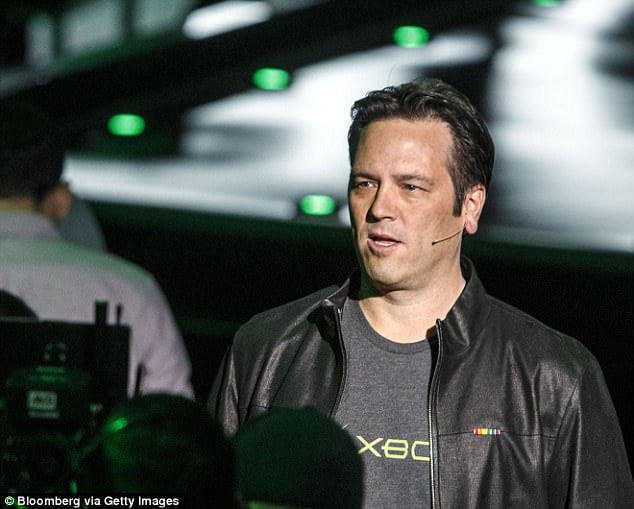

Xbox chief Phil Spencer (pictured) believes that a Netflix-like subscription gaming service could help independent producers and story-line orientated single player games to make a resurgence (stock image)
Xbox already offers an on-demand library of older titles, called Xbox Game Pass, which allows gamers to play over 100 Xbox One and Xbox 360 games.
But the company’s chief Phil Spencer believes that the industry should seek to create original content in the same way as subscription-based services like Netflix.
Under the traditional model, vast amounts of money was spent on headline grabbing franchise games, as well as some smaller standalone titles, which would then be recuperated through sales.
The focus was on engaging single-player story lines, akin to movies, with classics like Assassin’s Creed, Resident Evil and Tomb Raider.
This focus has switched in recent years, paritcularly with rising broadband speeds, to multiplayer games where players interact with hundreds of others online
This has meant that finding funding for more traditional games has become harder.
But under a subscription-based model, these types of games could be developed over time, with new episodes released, rather than whole games having to be funded by producers up-front.
Speaking to the Guardian, Mr Spencer said: ‘The storytelling ability in TV today is really high, and I think it’s because of the business model.
‘I hope as an industry we can think about the same.
‘I’ve looked at things like Netflix and HBO, where great content has been created because there’s this subscription model
‘[Subscription services] might spur new story-based games coming to market because there’s a new business model to help support their monetisation.
‘It would mean you wouldn’t have to deliver the whole game in one month; you could develop and deliver the game as it goes.’
Part of the shift from single-player offline games to multiplayer online experiences has meant that, rather than a game being delivered as a finished article, producers continue to support them once they are released.
Mr Spencer terms this a ‘service-based’ game, and they include titles like Call of Duty, Elder Scrolls Online and Destiny.
New content is made available in the form of DLC (downloadable content) packs and season passes, which can include new maps, missions, items and other expansions.

This focus has switched in recent years to multiplayer games where players interact with hundreds of others online. This has meant that finding funding for more traditional games has become harder (stock image)
But these often come at a hefty cost and, combined with other in-game purchases, can leave gamers reluctant to invest further time and money.
It also makes it harder for the older-style story-line driven games to make money.
Mr Spencer added: ‘The audience for those big story-driven games… I won’t say it isn’t as large, but they’re not as consistent.
‘You’ll have things like Zelda, or Horizon Zero Dawn, that’ll come out, and they’ll do really well, but they don’t have the same impact that they used to have, because the big service-based games are capturing such a large amount of the audience.
‘We’ve got to understand that if we enjoy those games, the business opportunity has to be there for them.
‘As an industry, I want to make sure both narrative-driven single-player games and service-based games have the opportunity to succeed. I think that’s critical for us.’
[“Source-dailymail”]

